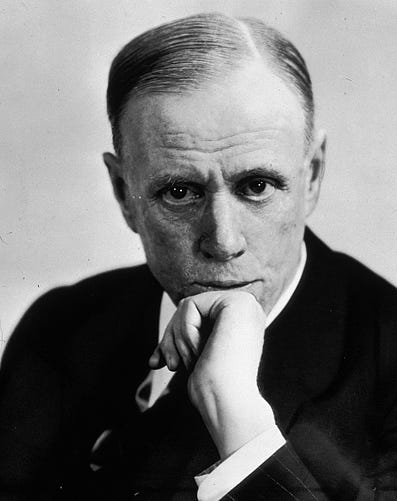|
 |
The Writer's Almanac from Wednesday, October 23, 2013
"The Old Woman Gets Drunk with the Moon" by Hailey Leithauser, from Swoop. © Graywolf Press, 2013.
ORIGINAL TEXT AND AUDIO - 2013
It's the birthday of British poet Robert Bridges, born in Kent, England (1844). His collections include The Growth of Love: A Poem in Twenty-Four Sonnets (1876) and The Chivalry of the Sea (1916). He went to medical school at Oxford, and was a doctor at numerous hospitals. The whole time that he was practicing medicine, he wrote sonnets, poems, and plays. In 1913, Bridges beat out Rudyard Kipling to earn the post of poet laureate. He served during World War I and was asked to write many official pieces. Shortly after the war started, The Times published his patriotic poem "Wake up, England!" The war took a toll on him. He said: "The war is awful. I can scarcely hold together. [...] Just at present I am far too disturbed to write, the communication with my subconscious mind is broken off."
One afternoon, the elderly Bridges was visited by Virginia Woolf and Aldous Huxley. Woolf described their initial meeting: "[Bridges] sprang from a rhododendron bush, a very lean tall old man, with a curly grey hat, [and] a reddish ravaged face, smoky fierce eyes, with a hasy look in them; very active; rather hoarse, talking incessantly."
Robert Bridges wrote the lines:
My delight and thy delight
Walking, like two angels white,
In the gardens of the night:
My desire and thy desire
Twining to a tongue of fire
Leaping live, and laughing higher;
Thro' the everlasting strife
In the mystery of life.
It's the birthday of best-selling novelist Michael Crichton, born in Chicago in 1942. He grew up in a suburb of New York, and his dad was the editor of Advertising Age magazine.
He liked to write, and when he was 13, he was on a family vacation to Sunset Crater National Monument in Arizona. He loved it, and he told his parents how surprised he was that there weren't more visitors, and they encouraged him to write about it. His mom said he should send an article to The New York Times, and his dad told him to go interview the ranger. So his family waited outside while Michael went in to do his interview. He recalled later: "Back in the car, driving to the next place, my father said, 'How many visitors do they have every year?' 'I didn't ask that,' I said. 'Is it open all year round?' 'I didn't ask that, either.' 'What was the ranger's name?' 'I didn't ask.' 'Jesus,' my father said. 'What published information did you get?' I showed him the pamphlets and brochures. 'Well, that'll be enough. You can write the story from that.'" And sure enough, The New York Times published his piece, and he was paid $60. He decided that writing was for him.
Crichton went to Harvard to be an English major, but one of his professors didn't like Crichton's writing style and kept giving him C's. So for an assignment on Gulliver's Travels, he turned in an essay written not by him but by George Orwell, and the professor gave him a B- on that. He figured that if Orwell only got a B- at Harvard, the English department was too difficult for him, so he went ahead and switched his major from English to anthropology.
He went on to medical school, but tuition was so expensive that he decided to keep writing to make some extra money, and he tried his hand at novels. His first novel was Odds On (1966), and Signet bought it and then asked who his agent was, so he had to go out and find one. Michael Crichton was a very tall man, 6 feet 9 inches, so he published his first thrillers under the pen name John Lange — lange is the German word for "tall." He was publishing between two and three novels a year, so he wanted a different pseudonym for some of them, and he chose "Jeffrey Hudson" for his first big medical thriller, A Case of Need (1968) — Jeffrey Hudson was a famous 17th-century dwarf in the court of King Charles I. The Andromeda Strain (1969), published under his own name, was a best-seller, and Crichton decided to devote his career to writing after all.
Many of his novels explore the unintended consequences of science or technology gone too far. His books include Jurassic Park (1990), Rising Sun (1992), and State of Fear (2004). He managed to be a huge success not only in the literary world, but also in film and television. He was a Hollywood director, and he wrote the screenplay for some of the film adaptations of his books, including Jurassic Park. He also created the hit TV series E.R.
Crichton died in 2008 from complications of throat cancer.
This day 1978 marked the publication of The Stories of John Cheever, which won the Pulitzer Prize, the National Book Critics Circle Award, and the National Book Award, and became one of the few collections of short stories ever to make the New York Times best-seller list. Cheever died in 1982, just four years after the book was published. Called by some "the Chekhov of the suburbs," Cheever chose to have most of his stories feature middle-class Americans on New York City's Upper East Side, or its Hudson Valley suburbs.
In his story "The Swimmer," he wrote about a man at a cocktail party who decides on a whim to swim home to his house by way of all the swimming pools in the neighborhood. Cheever wrote: "He seemed to see, with a cartographer's eye, that string of swimming pools, that quasi-subterranean stream that curved across the county. He had made a discovery, a contribution to modern geography; he would name the stream Lucinda after his wife. [...] Making his way home by an uncommon route gave him the feeling that he was a pilgrim, an explorer, a man with a destiny, and he knew that he would find friends all along the way; friends would line the banks of the Lucinda River."
Cheever described his stories as coming from "a long-lost world when the city of New York was still filled with a river light, when you heard the Benny Goodman quartets from a radio in the corner stationery store, and when almost everybody wore a hat. Here is the last of that generation of chain smokers who woke the world in the morning with their coughing [...] who were truly nostalgic for love and happiness, and whose gods were as ancient as yours and mine, whoever you are."
And on this day in 1920, the novel Main Street by Sinclair Lewis was published. Lewis had first envisioned a novel about small-town life 15 years earlier. He wrote: "Back in 1905, in America, it was almost universally known that though cities were evil and even in the farmland there were occasional men of wrath, our villages were approximately paradise. They were always made up of small white houses under large green trees; there was no poverty and no toil worth mentioning; every Sunday, sweet tempered, silvery pastors poured forth comfort and learning; and while the banker might be a pretty doubtful dealer, he was inevitably worsted in the end by the honest yeomanry. But it was Neighborliness that was the glory of the small town. I was converted to the faith that a good deal of this Neighborliness was a fake; that villages could be as inquisitorial as an army barracks." Lewis himself had grown up in Sauk Centre, Minnesota, a town of 2,800 citizens. He planned to call his novel The Village Virus, and to make the main character a misfit lawyer. He wrote 20,000 words, but he didn't like it and threw it out.
Then in 1916, he brought his new wife, Gracie, on a visit to Sauk Centre. They stayed with his parents, and he cringed to see some of the interactions between his parents and his modern, well-educated, New York City wife. He decided to rethink the novel so that it centered on a sophisticated young city woman who comes to town as the bride of the local doctor.
It was still a few years before Lewis began working on his novel in earnest. Once he did start, in November of 1919, he wrote his first draft — 221,000 words — in just 14 weeks. He reimagined Sauk Centre as the fictional town of Gopher Prairie. From there, he revised endlessly, and he wasn't shy about chopping out entire scenes or sections — he cut out all but a few pages of the first 30,000 words of this new novel. By early summer, he felt ready to send it to a publisher, his friend Alfred Harcourt, who had just started the new publishing house of Harcourt, Brace and Howe. (Lewis had encouraged Harcourt to start the business, and had bought $2,000 worth of stock to help get it off the ground.) Harcourt and Lewis did a final edit together, and the manuscript was finished by July 1920, just eight months after Lewis had started writing it. The Village Virus was retitled Main Street.
Lewis's previous books hadn't sold very well, but he was optimistic that he could sell 25,000 copies of Main Street. The first printing of 10,000 copies sold out in record time, and Harcourt couldn't get enough paper to meet the demand, so had to publish several smaller printings. Lewis's total sales goal of 25,000 was met by November, and within a few years, Main Street had sold 2 million copies.
In 1921, the Pulitzer committee unanimously recommended Main Street, but the trustees of Columbia University vetoed it and instead chose Edith Wharton's Age of Innocence (1922), which they praised for its "wholesome atmosphere of American life and the highest standard of American manners and manhood." Lewis was annoyed, but he admired Wharton and sent her a sincere congratulatory letter. Wharton wasn't too pleased either, since the trustees thought her novel was praising a way of life she meant to be criticizing; she responded to Lewis: "When I discovered that I was being rewarded — by one of our leading Universities — for uplifting American morals, I confess I did despair. Subsequently, when I found the prize should really have been yours, but was withdrawn because your book (I quote from memory) had 'offended a number of prominent persons in the Middle West,' disgust was added to despair." Two years later, the same thing happened with Lewis's next novel, Babbitt (1922); it was recommended for the Pulitzer, but again it was overruled by the trustees, this time losing to Willa Cather's One of Ours (1922). Lewis wrote in a letter to his father: "I'm quite sure I never shall get the Pulitzer — my books are too critical to please polite committees. [...] Personally I don't care a hang." When he was offered the 1926 Pulitzer for Arrowsmith (1925), he refused it. But in 1930, Lewis became the first American to win the Nobel Prize in literature, an honor that he accepted.
Be well, do good work, and keep in touch.®
December 18, 2024
7:00 p.m.
The Town Hall, New York, NY
A PRAIRIE HOME COMPANION CHRISTMAS Songs, Stories, Sketches, and our Same Old Sponsors
If you are a paid subscriber to The Writer's Almanac with Garrison Keillor, thank you! Your financial support is used to maintain these newsletters, websites, and archive. If you’re not yet a paid subscriber and would like to become one, support can be made through our garrisonkeillor.com store, by check to Prairie Home Productions, P.O. Box 2090, Minneapolis, MN 55402, or by clicking the SUBSCRIBE button. This financial support is not tax deductible.


